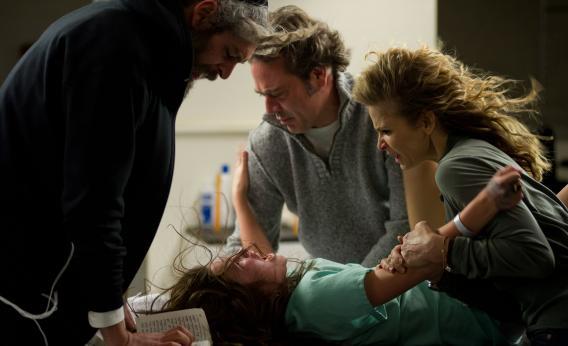The trailer for the new Sam Raimi production The Possession, with its flashing images of Hasidic rabbis (yes, that was Matisyahu) and Hebrew-inscribed antiques, might seem intriguing, especially given that almost all exorcism movies of the past have drawn their mythological material from the trove of Catholicism.* Sadly, Danish director Ole Bornedal does not do his Jewish subject matter justice. (The film is itself possessed by the clichés of exorcism movies’ past, and is riddled with plot holes.) But that doesn’t mean we can’t use the opportunity to examine the independently fascinating ideas on which he riffs. Are there really demons in the Jewish tradition?
Yes, even though their role in today’s faith is minimal.
Possession takes as its starting point the existence of dislocated sprits called dybbuks who, unless safely imprisoned in consecrated vessels, will seduce or otherwise force their way into the bodies of innocents, tormenting and even killing their hosts. According to J.H. Chajes, a professor of Jewish history at the University of Haifa who has written a book about the subject, dybbuks and other kinds of evil spirits were a normal aspect of everyday life for Jews of the 16th and 17th centuries, especially in communities descended from the Sephardic culture of pre-Inquisition Spain, which was particularly fascinated with the occult. Indeed, though Jewish ideas of possession in the period mirrored the contemporaneous Christian and Islamic notions in aesthetic terms (violent contortions, frightening speech, etc.), they were in other ways quite distinct.
For starters, possessions in Judaism were not always a bad thing. Kabalistic mystics were known for seeking out a merging of souls, which could help them gain spiritual insight. To invite such possessions, they would prostrate themselves on the graves of highly regarded ancestors and clerics. By some rabbi’s teachings, it was even possible to be possessed for performing a specific mitzvah perfectly; other souls who were similarly adept at the same holy deed would feel the power of the act and be drawn to the practitioner whether he intended such a union or not.
Another key difference from Christian theology was the fact that 17th century Jews tended to place more emphasis on possession by souls of the dead than by special entities like devils. In fact, Christian orthodoxy at the time stated that deceased human souls could not possess the living (though they could appear as apparitions), while demons were a real danger. According to Jewish thought, the souls of particularly ignoble people were prohibited from entering even gehinnom—a state akin to purgatory where the less righteous could work toward redemption over the course of a year—and so were cursed to lodging themselves in objects or people.
In The Possession, Matisyahu’s character explains to the terrified father of the possessed child that dybbuks seek out the innocent, especially children; however, the common belief back in the heyday of possession was that victims were probably guilty of some secret indiscretion that made them vulnerable to infiltration. On the other hand, the movie does get the exorcism scene basically right: Candles are lit, the victim is held down, and the possessor is compelled though special Hebrew prayers and recitations to speak his or her name. Once the rabbi had that crucial bit of information, he could order the spirit out of the body and into some kind of vessel, often a glass flask, which could then be rinsed clean with water. Historical documents suggest that Jews were once so admired for their skill with this supernatural form of pest control that Christians would often call on them for help with their own infestations.
Though the importance of dybbuks in Jewish life (especially in the less orthodox sects) has diminished considerably over the last three centuries, claims of possession still occur. Perhaps the most recent case came from Israel in 2010, when a rabbi attempted to exorcise a Brazilian man.
*Correction, Aug. 31, 2012: This post originally misspelled producer Sam Raimi’s name.
